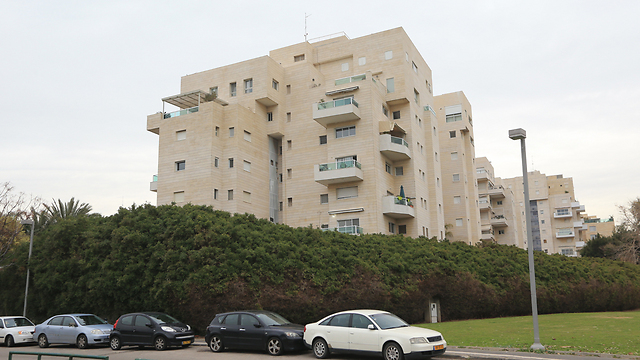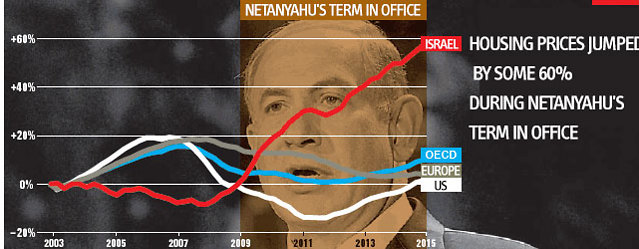
The chart of despair in Netanyahu's land
If there are any happy Israelis, they must be the ones who inherited an apartment or won the lottery. All the rest submissively accept their fate as if it were a force majeure.
The OECD's economic survey of Israel belongs to the old genre of recycled news. Its fame is short lived, lasting only for a single day of bleak headlines. Do we really need Ángel Gurría to tell us about the burden of the cost of living, the unbearable housing prices, the extremely long work hours and the contaminated air that we breathe? Hey! We are the ones living here.
The report published in the beginning of the week wasn't any different than the previous reports. Data heavy, almost indigestible, a light bump to the wing of the ritual news cycle: A terror attack and a fierce comment of the Prime Minister, an act of incitement and a mumbled denouncement of the Prime Minister, and the coincidental storm in a teacup.
And amidst all that chatter, I am asking you to take another look at one chart in the cumbersome report. Please bear with me. This chart describes the illness of Israel's housing market since 2003. It is strikingly fascinating to see what happened to property prices since 2009, the year in which Benjamin Netanyahu took office, and never left.
Property prices in Europe plunged a little in the last seven years; in the US they remained unchanged, the OECD average rose a bit, while in Netanyahu's land we see a sharp, insane, almost inconceivable jump of some 60 percent.
Talking about percentages could sometimes be constrained to an abstract discourse, so let's talk money. A young couple has to hand out an additional NIS 600,000 for buying an ordinary apartment in order to cover the gap between the price of such property in 2009 and its current price.
In other words, the couple's income should have increased by NIS 1,000,000, before taxes, in that period.
Some may be lucky enough to have their salary rise by a seven figure margin, but real wages in Israel have been practically frozen in the past seven years.
Newspapers have been writing about the soaring housing prices for years, finance ministers came and went; housing (or building) ministers repeatedly changed their titles.
But the Prime Minister is still the same Prime Minister since 2009. He was the first to not recognize the crisis. All throughout 2011, when charts were frivolously running wild, when hundreds of thousands of angry young adults took to the streets to set up tents, when it was crystal clear who is responsible for the crisis and whose duty it is to solve it, Netanyahu kept on doing what he does best: making promises with no intention of delivering, communicating in fierce or mumbled comments, depending on the mood. Simply put, he had done nothing at all.
The chronic helplessness of the worst Prime Minister in Israel's history is neither new nor surprising. So is the attempt of focusing on the housing fiasco. What is stunning is the weird apathy with which we accept Netanyahu's incompetence, as if it were a force majeure.

In the last seven years, Netanyahu, in his own bare incompetent hands, made hundreds of thousands of young couples (and their parents) give up hope on buying a reasonably priced house, and demolished the economic fundamentals of Israel's middle class. Other politicians in his position lost their seat for much smaller failures, here, there and everywhere. So why is Netanyahu still the Prime Minister?
Another, somewhat strange, report by the OECD measured the wellbeing of Israel's citizens. If there are any happy Israelis, they must have inherited an apartment or won the lottery. It seems like the rest submissively accept their fate, as there is no hope for a change on the horizon. If that is the case, then the chart above not only describes Israel's crazy surge in housing prices, but also the despair of Israelis who live in Netanyahu's land.












